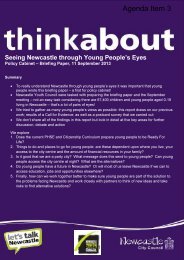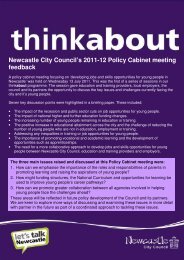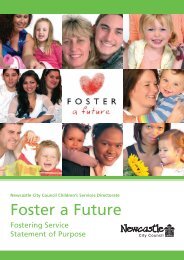- Page 1 and 2: Everyone’sTomorrowThe Strategy fo
- Page 3 and 4: 1A vision for Newcastle 2021Newcast
- Page 5 and 6: 3ForewordBernard Baruch, the Americ
- Page 7: 5Table of contentsPage1. Introducti
- Page 10 and 11: 8the population. Older people seek
- Page 14 and 15: 122 Older people themselves are cha
- Page 16: 14National policyGovernment policy
- Page 19 and 20: 17MainstreamingThis strategy will a
- Page 21 and 22: 19cities - the Healthy Cities - Hea
- Page 23 and 24: 21Fig. 2: Newcastle Strategy for Ol
- Page 25 and 26: 23Aim 1Making a positivecontributio
- Page 27 and 28: 25ContextIncreasingly public servic
- Page 29 and 30: 27The Elders Council and Quality of
- Page 31 and 32: 29ActionsThe work of building the v
- Page 33 and 34: 31There is an increasing need for o
- Page 35 and 36: 33Where we are nowThere is a consid
- Page 37 and 38: 35 The creation of opportunities fo
- Page 39 and 40: 37Attitudes to older peopleOlder pe
- Page 41 and 42: 39Actions Carry out an audit of cov
- Page 43 and 44: 41There are a number of initiatives
- Page 45 and 46: 43Aim 2Accessing information,advice
- Page 47 and 48: 45Outcome 2aOlder people have acces
- Page 49 and 50: 47Where we are nowThe Quality of Li
- Page 51 and 52: 49Other specialist services are als
- Page 53 and 54: 51Aim 3Physical, mental andemotiona
- Page 55 and 56: 53ContextNewcastle is one of the mo
- Page 57 and 58: 55Outcome 3aOlder people and carers
- Page 59 and 60: 57 Age Concern Newcastle, which pro
- Page 61 and 62: 59Newcastle City Council Arts Team
- Page 63 and 64:
61Information and accessInformation
- Page 65 and 66:
63 Develop a ‘life in older age
- Page 67 and 68:
65Dementia 11.2%Stroke 9.5%Musculo-
- Page 69 and 70:
67Newcastle is uniquely placed at t
- Page 71 and 72:
69 Encourage older people to explor
- Page 73 and 74:
71It is often difficult to reach ou
- Page 75 and 76:
73Mrs D is a 76-year-old fiercely i
- Page 77 and 78:
75Outcome 3dOlder people have acces
- Page 79:
77Older people will also continue t
- Page 82 and 83:
80Aim 4Enjoying older person friend
- Page 84 and 85:
82The Local Development Framework C
- Page 86 and 87:
84Safe Neighbourhoods is a project
- Page 88 and 89:
86Outcome 4bOlder people have decen
- Page 90 and 91:
88for housing in the city over the
- Page 92 and 93:
90to develop new financial products
- Page 94 and 95:
92Older people are a key client gro
- Page 96 and 97:
94The role of Neighbourhood Managem
- Page 98 and 99:
96 Deliver Warm Zone initiatives an
- Page 100 and 101:
98Where we are nowOlder people have
- Page 102 and 103:
100Strategic planning and transport
- Page 104 and 105:
102Aim 5Financially and materially
- Page 106 and 107:
104Outcome 5aOlder people have the
- Page 108 and 109:
106Actions Include financial litera
- Page 110 and 111:
108Where we are nowAge Concern have
- Page 112 and 113:
110Section 4: Turning the strategy
- Page 114 and 115:
112 The population in Newcastle and
- Page 116 and 117:
114 However, there is a growing int
- Page 118 and 119:
116Use of Adult Social Services Dur
- Page 120 and 121:
118 58.4% of people aged 50+ were v
- Page 122 and 123:
120Annex 2: Links to key national a
- Page 124 and 125:
122Newcastle Strategyfor Older Peop
- Page 126 and 127:
124Other strategies mentioned in th
- Page 128 and 129:
126Newcastle Science CityNewcastle
- Page 130 and 131:
128Annex 4: ConsultationThe draft s
- Page 132 and 133:
130What was changed?Overall, feedba
- Page 134 and 135:
132Annex 5: List of agencies mentio
- Page 136 and 137:
134Public Sector organisationsAudit
- Page 138 and 139:
136PartnershipsDementia Care Partne
- Page 140 and 141:
138Equality Standard for Local Gove
- Page 142 and 143:
140Positive Ageing is a pilot cours
- Page 144 and 145:
14214 Sure Start for Older People15
















